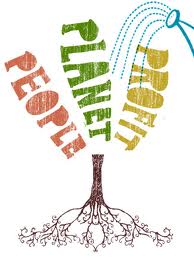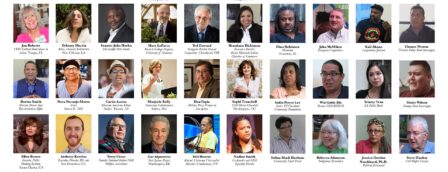
Last Friday, I presented 12 businesses in the Tampa Bay Area with Earth Charter US (ECUS) Sustainable Business Awards for engaging with the triple bottom line—people, planet and profit. When I created these awards for ECUS, I saw them as a way to recognize and to bring to the public’s attention those business that were doing the right thing as well as a way to influence other businesses to do the same. I am pleased to report that some of that has been accomplished. However, this path towards sustainability has not always gone smoothly and is not without its pitfalls.
Here is the process for the awards. Businesses nominate themselves via a nomination survey on the ECUS website and then MBA students from the University of Tampa’s College of Business screen the nominations and interview the companies to evaluate on people (employee and community wellbeing), planet (environmental health) and profit (economic performance). The criteria have been developed over the past 3 years by the students using the Global Reporting Initiative and the Earth Charter as a guide. I’ve taught the last three MBA class in which we use the Sustainable Business Awards as a class project so I’ve been pretty close to this process and want to share the highlights along with some cautionary thoughts.
First and foremost it is very exciting to hear and see the reactions of the business winners and the MBA students to these awards. For many of the businesses, sustainability means environmental and does not include the Earth Charter’s framework for people and all of humanity and life on this planet. They learn through their interviews with the students that the wellbeing of their employees and the community are considered on a par with their environmental practices.
What is especially nice to hear is the delight of the business folks when they learn that they are paying a living wage and what that means or the fact that they did not reduce employee healthcare coverage when their own costs went up and that this is an important factor in the consideration of their nomination. One of the remarks that I hear fairly often is that the business would be aware of its good environmental practices but would not think that all the things it was doing for employees and the community was “sustainable” and, therefore, worthy of recognition.
It’s also wonderful to hear the reactions of the students as they go through the interview process and hear about the good things that the businesses are accomplishing for people and the planet. They usually are surprised and delighted to know that these efforts are being made by local business folks. Their interviews and handing out the awards at the event also give them a nice entry into the sustainable business community and possible jobs. The award winners are invited to participate in the ECUS Sustainable Business Coalition where companies learn more about best practices and network with one another.
It’s a win-win approach—businesses, students and community members get educated about the Earth Charter’s ethical framework, the triple bottom line approach, and which companies are doing the right thing in the community plus ECUS brings in some funds from the event sponsorships to pay a part time Director for the Sustainable Business Coalition.
Now, here is my note of caution. Although, the MBA students do some research on the companies, most of what they learn about them comes down to what they are told. Companies on the other hand, like to be recognized for being sustainable and might oversell their company’s practices. The awards are given in 3 categories of businesses based on size: small—less than 50 employees; medium 51 to 499 employees and large—over 500 employees. The small and medium size companies are usually locally owned and the owners or executives are often known by members of ECUS board. This latter fact appears to make it easier to know or to find out more reliably about the company’s practices.
The large companies pose a dilemma because they are more widespread around the country or globally and getting information is not as easy. There have been a couple of large winners that got less than positive reaction from some community members. However, either the previous professor or the students themselves were convinced the company was a good candidate. ECUS has sought to make the awards be the result of an impartial third party and since the students do the evaluations, their voice is a heavy one on the choice for the award.
The sustainable business awards’ event is always filled to capacity and the excitement of the businesses in being recognized and in connecting with other like-minded businesses produces a high level of positive energy that is contagious. I do not believe my cautionary concern about the large businesses should mean that the large category in the awards be omitted but I wonder if it would be better to limit the winners to locally owned businesses. That seems like a good area for discussion among ECUS board members and the next class of MBA students—whether I am teaching or not. Meanwhile,the awards appear to educate the companies about the fuller meaning for “sustainability”. Gauging from their participation in the ECUS Sustainable Business Coalition, it appears that the awards also spark an interest in knowing more about sustainable practices and in linking with other sustainable businesses. So, yes, the awards do seem to work, and could also be improved upon with a change made in the “large” category.
